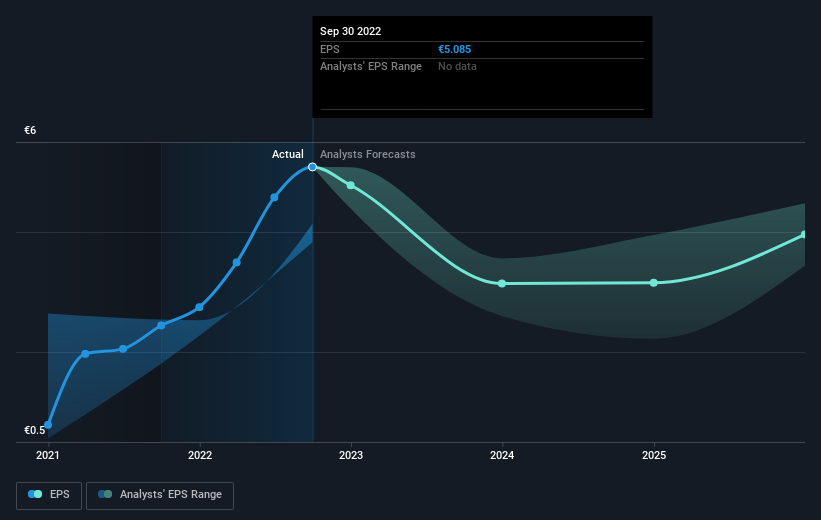- Austria
- /
- Basic Materials
- /
- WBAG:WIE
Wienerberger's (VIE:WIE) five-year earnings growth trails the decent shareholder returns

When we invest, we're generally looking for stocks that outperform the market average. And while active stock picking involves risks (and requires diversification) it can also provide excess returns. For example, the Wienerberger AG (VIE:WIE) share price is up 38% in the last 5 years, clearly besting the market return of around 8.8% (ignoring dividends).
After a strong gain in the past week, it's worth seeing if longer term returns have been driven by improving fundamentals.
Check out our latest analysis for Wienerberger
While markets are a powerful pricing mechanism, share prices reflect investor sentiment, not just underlying business performance. One way to examine how market sentiment has changed over time is to look at the interaction between a company's share price and its earnings per share (EPS).
During five years of share price growth, Wienerberger achieved compound earnings per share (EPS) growth of 42% per year. This EPS growth is higher than the 7% average annual increase in the share price. So it seems the market isn't so enthusiastic about the stock these days. The reasonably low P/E ratio of 5.25 also suggests market apprehension.
You can see below how EPS has changed over time (discover the exact values by clicking on the image).

We know that Wienerberger has improved its bottom line over the last three years, but what does the future have in store? If you are thinking of buying or selling Wienerberger stock, you should check out this FREE detailed report on its balance sheet.
What About Dividends?
It is important to consider the total shareholder return, as well as the share price return, for any given stock. The TSR incorporates the value of any spin-offs or discounted capital raisings, along with any dividends, based on the assumption that the dividends are reinvested. It's fair to say that the TSR gives a more complete picture for stocks that pay a dividend. As it happens, Wienerberger's TSR for the last 5 years was 56%, which exceeds the share price return mentioned earlier. The dividends paid by the company have thusly boosted the total shareholder return.
A Different Perspective
While it's never nice to take a loss, Wienerberger shareholders can take comfort that , including dividends,their trailing twelve month loss of 8.1% wasn't as bad as the market loss of around 10%. Of course, the long term returns are far more important and the good news is that over five years, the stock has returned 9% for each year. It could be that the business is just facing some short term problems, but shareholders should keep a close eye on the fundamentals. While it is well worth considering the different impacts that market conditions can have on the share price, there are other factors that are even more important. Take risks, for example - Wienerberger has 2 warning signs (and 1 which is concerning) we think you should know about.
If you would prefer to check out another company -- one with potentially superior financials -- then do not miss this free list of companies that have proven they can grow earnings.
Please note, the market returns quoted in this article reflect the market weighted average returns of stocks that currently trade on AT exchanges.
Valuation is complex, but we're here to simplify it.
Discover if Wienerberger might be undervalued or overvalued with our detailed analysis, featuring fair value estimates, potential risks, dividends, insider trades, and its financial condition.
Access Free AnalysisHave feedback on this article? Concerned about the content? Get in touch with us directly. Alternatively, email editorial-team (at) simplywallst.com.
This article by Simply Wall St is general in nature. We provide commentary based on historical data and analyst forecasts only using an unbiased methodology and our articles are not intended to be financial advice. It does not constitute a recommendation to buy or sell any stock, and does not take account of your objectives, or your financial situation. We aim to bring you long-term focused analysis driven by fundamental data. Note that our analysis may not factor in the latest price-sensitive company announcements or qualitative material. Simply Wall St has no position in any stocks mentioned.
About WBAG:WIE
Wienerberger
Produces and sells clay blocks, facing bricks, roof tiles, and pavers in Europe.
Moderate with reasonable growth potential and pays a dividend.


